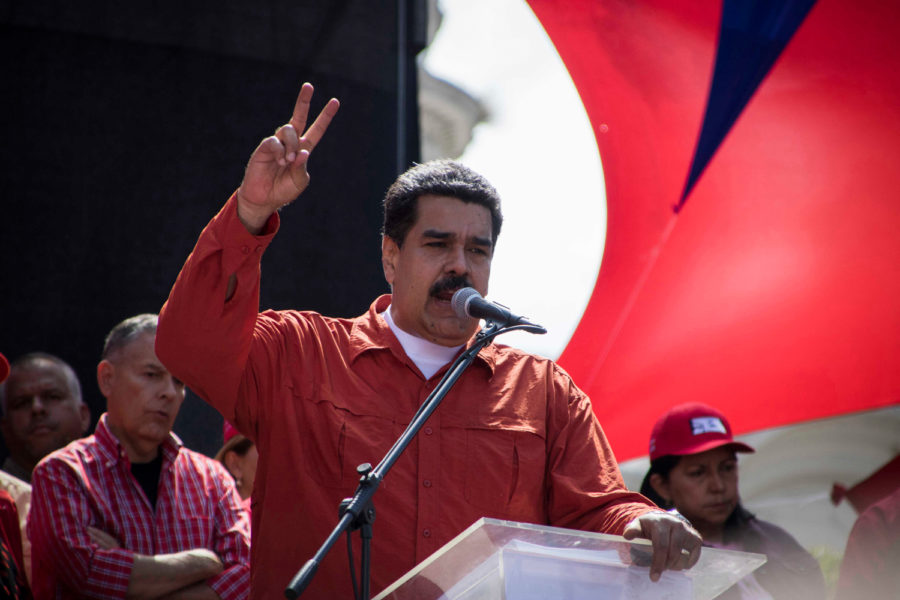Opinion | Trump must push out Venezuela’s dictator
(Rayner Pena/DPA/Abaca Press/TNS)
Venezuelan President Nicolas Maduro.
December 6, 2018
After months of bipartisan pressure, the Trump administration is finally prepared to add Venezuela to its list of states that sponsor terrorism, where it will join countries such as Iran, North Korea and Syria.
Adding Venezuela to the state-sponsored terrorism list is not only justified, considering Venezuela’s destabilizing presence across the world, but would also allow the United States to mount additional pressure against Venezuelan dictator Nicolas Maduro.
Maduro has demonstrated a willingness to brutally repress his citizens. Since the government controls food rationing and the majority of the population spends eight hours a week waiting in line for rations, Maduro is able to restrict rations for political opponents.
The autocratic leader has also imprisoned an estimated 300 to 600 political prisoners and reports of torture and execution are widespread. Maduro has consolidated so much power that the Venezuelan Supreme Court is in his pocket. The court dissolved the National Assembly in 2017 — the last holdout of Maduro’s political opposition.
An estimated 2.3 million Venezuelans, roughly 7 percent of the population, have left the nation and sought refuge in neighboring South American countries, destabilizing the region and causing tension between Venezuela and its neighbors. Venezuelan refugees also make up the majority of asylum-seekers to the United States, and the longer Maduro stays in power only increases the amount of refugees who are forced to leave Venezuela and seek uncertain safety in nearby countries.
Some American senators have recognized the extensive humanitarian impacts of Maduro’s reign.
“As millions flee repression, hunger and destitution at home, Nicolas Maduro’s criminal regime has turned Venezuela into a failed state with implications across the region,” Sen. Bob Menendez (D-N.J.), a leading member of the Senate Foreign Relations Committee, said.
Maduro has also filled his cabinet with dangerous people, which makes the prospect of him choosing his own successor dangerous. Maduro’s minister of industries and national production and former vice president, Tareck El Aissami, is a known financial supporter of terrorist organizations like Hezbollah and is connected with the international drug trade.
“Venezuela’s future is uncertain, but what is certain is that Islamic extremism has officially taken greater executive control of a national government in Latin America,” Joseph Humire, founder of the Center for a Secure Free Society, said.
Despite U.S. sanctions against Maduro’s regime, the nation’s dictatorship stays afloat through Chinese investment, with most other foreign investment coming from Russia. Venezuela has received $62 billion in loans from China since 2008, which either goes toward sustaining Venezuela’s vastly diminished oil sector or is used by the Maduro regime to purchase military goods from China and Russia. While most of its citizens starve, Venezuela’s government spends the most on military goods among all South American nations.
The current set of U.S. sanctions on Venezuela is not putting enough pressure on Maduro’s regime. Maduro has demonstrated that he is able to finance his regime, and he has intimidated his civilian population to the point where they are no longer willing to hold mass protests. Maduro could be in power for years to come and it’s a threat the United States shouldn’t ignore.
In order to solve the Venezuelan crisis, the United States needs to intensify sanctions against Maduro and adding Venezuela to the list of state sponsors of terrorism grants access to additional diplomatic options.
By adding Venezuela to the state-sponsored terrorism list, the United States can weaken Maduro by limiting his ability to purchase arms from other countries, specifically China. Pressuring China to stop selling military goods to Venezuela will weaken Maduro’s ability to further arm pro-government militias and will isolate Maduro from his few remaining foreign supporters.
Additionally, the United States remains the largest market for Venezuelan crude oil in the world. Declaring Venezuela a state sponsor of terror will severely discourage continued business relationships with Venezuela, crippling Maduro’s ability to continue financing his corrupt regime.
Adding Venezuela to the list of state sponsors of terrorism is a condemnation of Maduro’s crimes. Most importantly, it demonstrates a U.S. commitment to combating dictatorial terror.
The United States must show it is committed to restoring democracy and the rule of law to Venezuela, and this move by the Trump administration is a good start. This new designation would give the United States much more flexibility in stopping Maduro, if the administration is prepared to act upon it. Only with a democratically elected government can Venezuela safely trade and provide humanitarian aid for its citizens.








